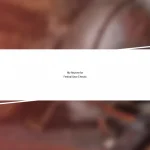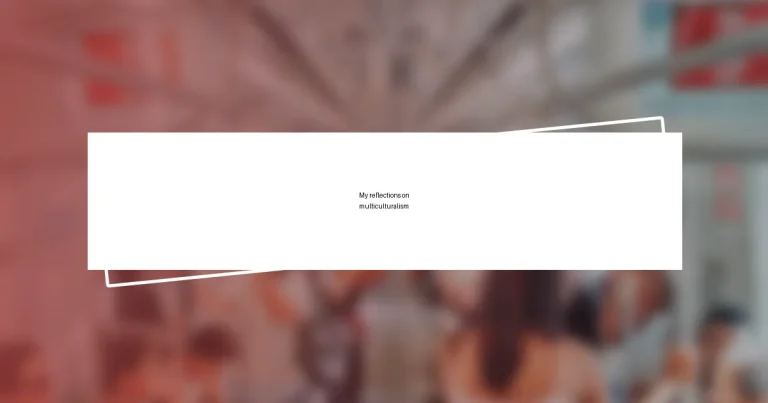Key takeaways:
- Multiculturalism enriches daily life through diverse cuisines, traditions, and perspectives, prompting dialogue and connection.
- Experiences in multicultural environments enhance creativity, communication skills, adaptability, and empathy.
- Challenges in multicultural societies, such as communication barriers and social fragmentation, necessitate fostering intercultural dialogue and cultural sensitivity.
- The future of multiculturalism relies on embracing change, supporting multifaceted identities, and leveraging technology for global connections.
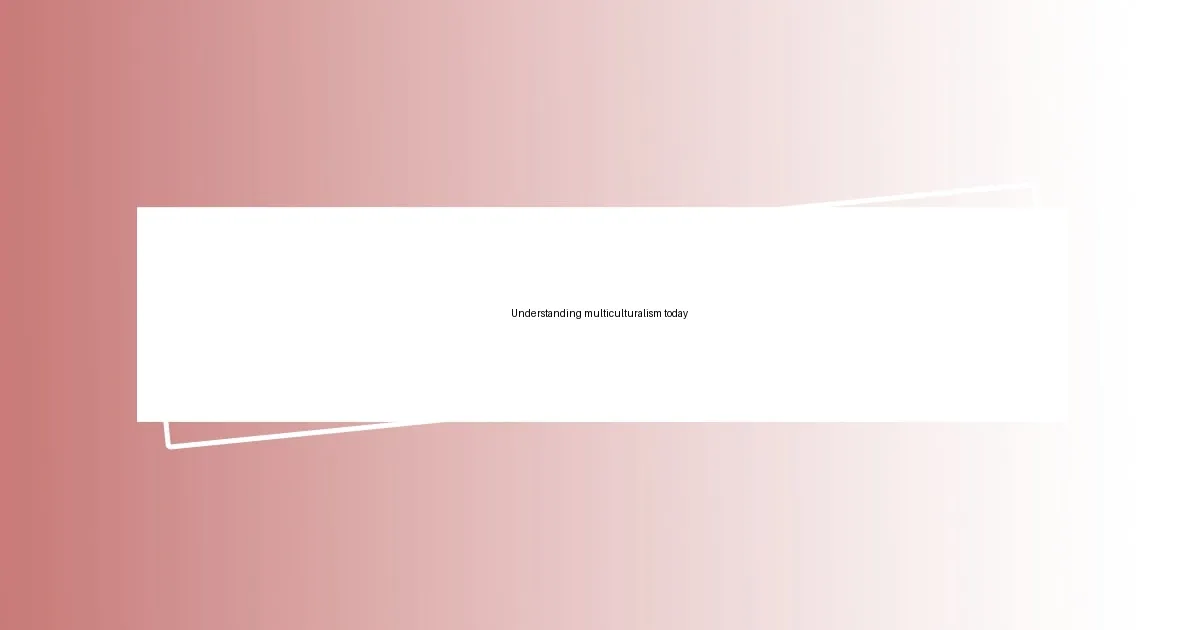
Understanding multiculturalism today
Understanding multiculturalism today requires recognizing how interconnected our world has become. I remember attending a local cultural festival where families from various backgrounds proudly showcased their traditions. It left me reflecting on how rich our shared experiences can be, even amidst our differences.
In today’s society, multiculturalism isn’t just a concept—it’s a living reality that permeates our daily lives. Have you ever paused to think about the incredible diversity of cuisines in your neighborhood? I find it fascinating how a single block can offer dishes from every corner of the globe, inviting both discovery and connection.
Moreover, multiculturalism challenges us to confront our biases and expand our perspectives. After engaging in meaningful discussions with friends from diverse backgrounds, I often feel my worldview shift; it’s a beautiful reminder that learning can happen at any moment if we are open to it. How can we cultivate these discussions further, inviting more voices into the conversation?
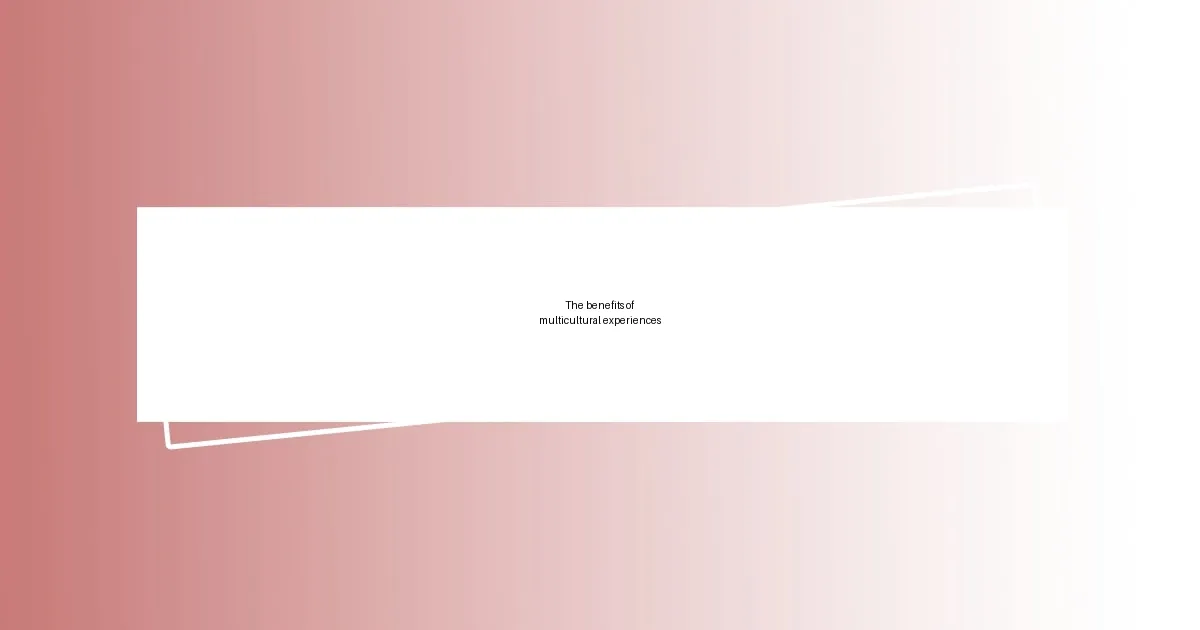
The benefits of multicultural experiences
Experiencing multicultural environments can profoundly enhance our emotional intelligence and empathy. I recall a time when I volunteered at a refugee center, learning firsthand about the challenges individuals faced simply to find safety and belonging. Each story I heard opened my eyes to the resilience embedded in diverse cultures, deepening my understanding of human experience.
The benefits of multicultural experiences include:
- Enhanced creativity and innovation: Different backgrounds foster unique ideas and solutions, driving progress.
- Better communication skills: Navigating diverse perspectives helps us articulate our thoughts more clearly and listen more actively.
- Increased adaptability: Exposure to various cultural practices equips us to handle change and uncertainty with grace.
- Broader social network: Meeting individuals from different backgrounds enriches our lives and offers an extended support system.
- Greater appreciation for diversity: Engaging with different cultures allows us to see the value in varied traditions and viewpoints, making us more inclusive.
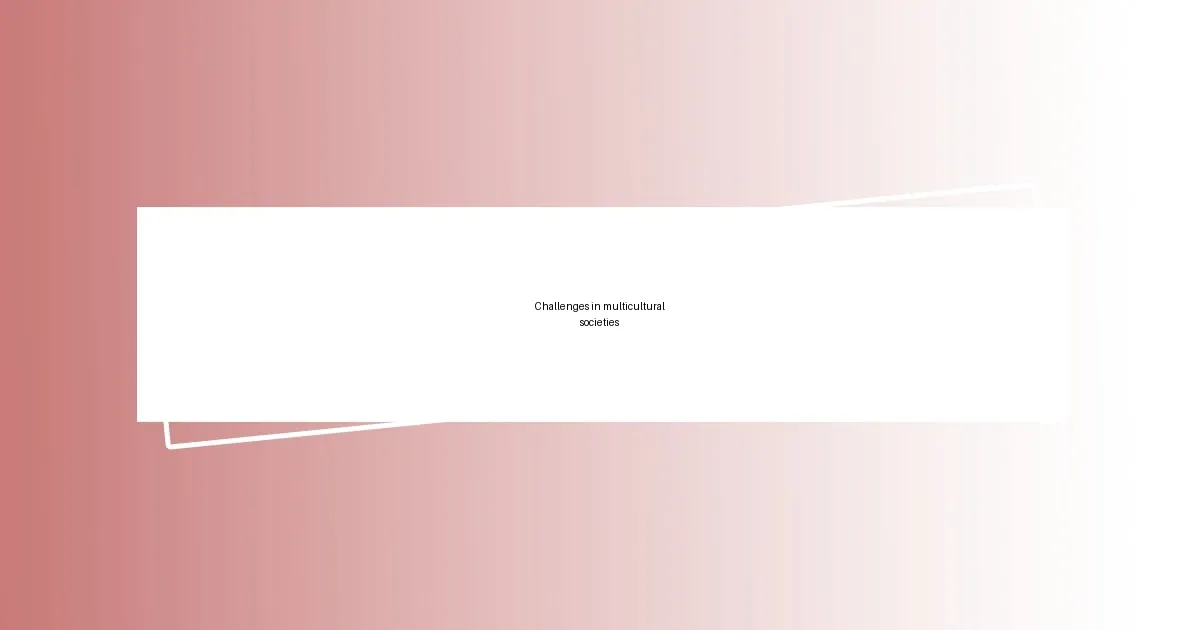
Challenges in multicultural societies
The challenges in multicultural societies often revolve around communication barriers and the potential for misunderstanding. I remember attending an international conference where representatives struggled to connect due to language differences. It reminded me how essential effective communication is; without it, ideas can easily be misinterpreted, creating unnecessary tension among individuals.
Another significant challenge is the conflicting cultural norms and values that arise from diverse backgrounds. I have witnessed moments where simple interactions, like dining together, became contentious due to differing food preferences and etiquette. These instances highlight the importance of cultural sensitivity and understanding, prompting us to navigate these differences with care and respect.
Finally, there’s the risk of social fragmentation. During a community meeting I attended, it struck me how individuals from various cultures often gravitate toward their own groups, leaving little room for cross-cultural engagement. This tendency can breed isolation and missed opportunities for growth. It’s crucial to foster spaces where diverse voices can come together, share their experiences, and learn from one another.
| Challenges | Examples |
|---|---|
| Communication Barriers | Language differences hindering meaningful exchanges |
| Conflicting Norms | Cultural misunderstandings in social settings |
| Social Fragmentation | Isolation within cultural groups instead of integration |
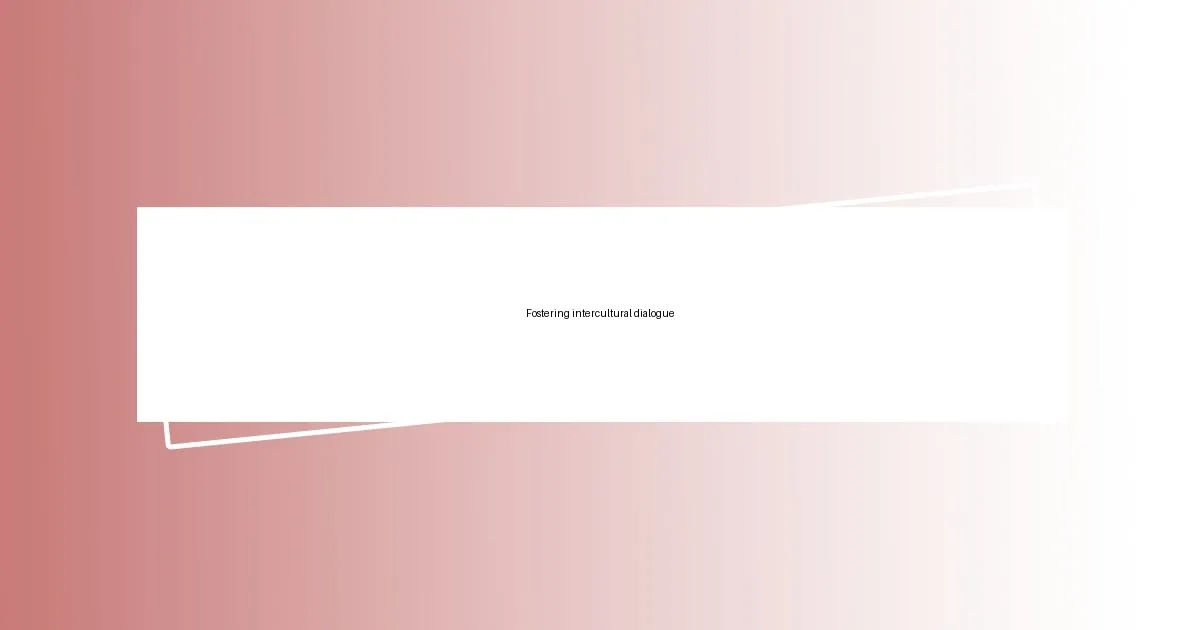
Fostering intercultural dialogue
Fostering intercultural dialogue is essential for creating mutual understanding. I vividly remember the first time I joined a local cultural exchange program. As I shared my own experiences with a group from various backgrounds, I couldn’t help but notice how our conversations flowed naturally. We didn’t just share facts; we shared stories, laughter, and sometimes, even tears that highlighted our shared humanity. Isn’t it fascinating how a simple conversation can break down the walls of misunderstanding?
Active listening plays a crucial role in intercultural dialogue, something I learned the hard way. During a discussion with a friend from a different culture, I found myself too eager to insert my opinions instead of truly hearing her perspective. It dawned on me that patience is vital in these dialogues. By genuinely engaging in others’ narratives, we not only honor their experiences but also enrich our own understanding. How many missed opportunities for connection arise from the habit of interrupting or dismissing?
Creating safe spaces for these conversations is equally important. I once facilitated a workshop aimed at sharing cultural insights within my community. The energy in the room was palpable as participants opened up and shared their cultural traditions and personal stories. Even though some topics were sensitive, that environment allowed us to tackle difficult conversations head-on. I realized then that fostering intercultural dialogue isn’t just about talking; it’s about creating a platform where everyone feels valued and heard. Wouldn’t we all benefit from embracing this approach more actively in our lives?
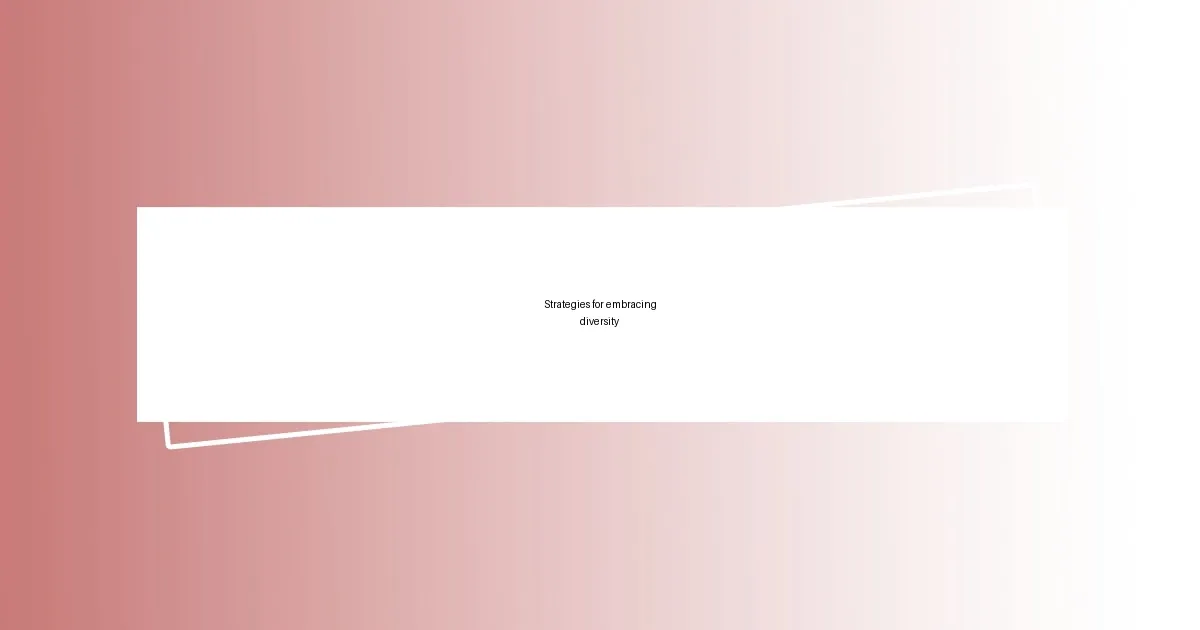
Strategies for embracing diversity
Embracing diversity requires intentional strategies that accommodate different perspectives and backgrounds. One approach I’ve found effective is cultivating cultural competency through education. I remember enrolling in a workshop that illuminated the similarities between my culture and others – we were all engrossed in our unique traditions but shared common human values. It was a revelation to see how much we had in common; it made me wonder: how often do we limit ourselves by focusing solely on our differences?
Another promising strategy is encouraging collaboration through inclusive practices. In a project I was part of, we formed diverse teams where each member brought their cultural nuances to the table. The result? Increased creativity and innovation. It struck me that when we create an environment where everyone feels empowered to contribute, we not only celebrate diversity but also enhance the quality of our outcomes. Isn’t it interesting how much richer our experiences and results become when diverse voices are included?
Lastly, I’ve realized the importance of community engagement initiatives. Participating in a local festival that celebrated various cultures allowed me to connect with neighbors I had never spoken to before. Sharing food, music, and traditions turned strangers into friends. It dawned on me that these experiences build bridges within our communities. How can we keep this momentum going? By continually seeking opportunities to engage with each other, we nurture an environment of respect and curiosity about our differences, turning diversity into a vibrant tapestry.
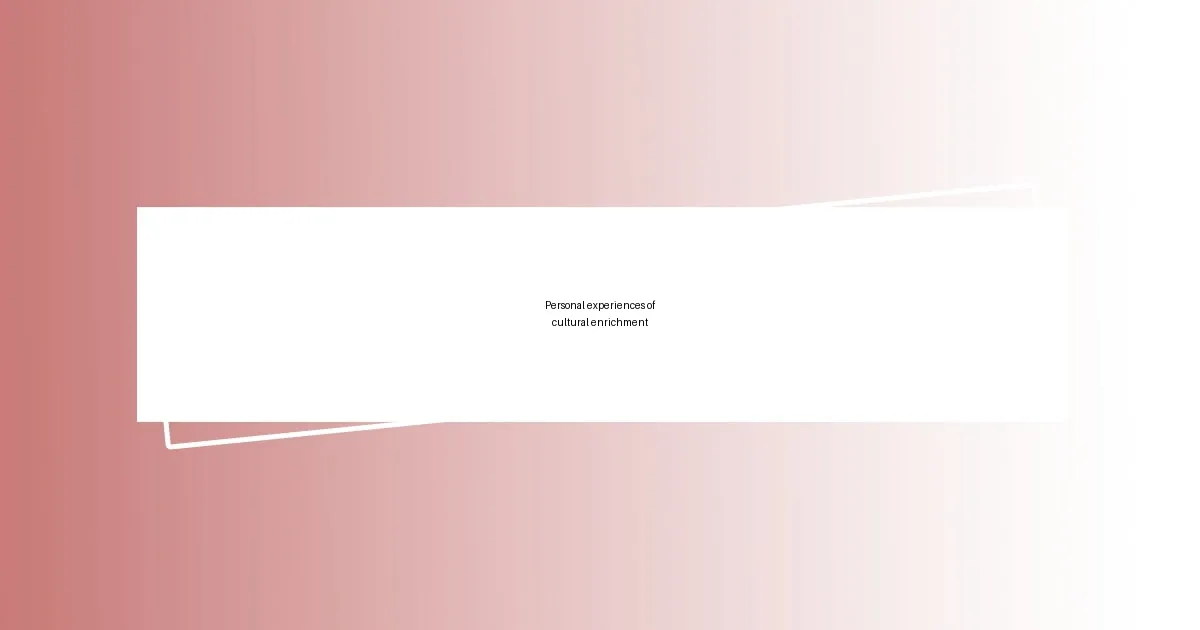
Personal experiences of cultural enrichment
Reflecting on personal experiences of cultural enrichment, I frequently think about the simmering excitement I felt during my first potluck dinner with a group of international friends. Each dish brought to the table was a story in itself—flavors I had never encountered came to life, and I found myself indulging in not just food but also traditions and histories from around the world. As I tasted a spicy curry from India, I was transported to the lively streets of Delhi through my friend’s vivid storytelling. Have you ever had a meal that felt like a journey?
There was also a time when I attended a traditional dance performance representing different cultural heritages. The atmosphere buzzed with anticipation, and as I watched the dancers, I was moved by the grace and passion they poured into each movement. It hit me that art is a universal language that transcends barriers—how powerful it is to witness joy and sorrow expressed through dance! Every performance seemed to echo the same sentiment: our differences weave a vibrant tapestry that enriches our lives.
One impactful experience for me was volunteering at a multicultural festival where I had the chance to interact with families from diverse backgrounds. I was struck by the warmth and enthusiasm we all shared while learning about each other’s customs. I remember listening intently to a local immigrant recount her journey of adapting and thriving in a new country. I couldn’t help but feel a deep sense of empathy and admiration for her resilience. Doesn’t it inspire you when you encounter stories like these, showcasing the strength and beauty of human connection?
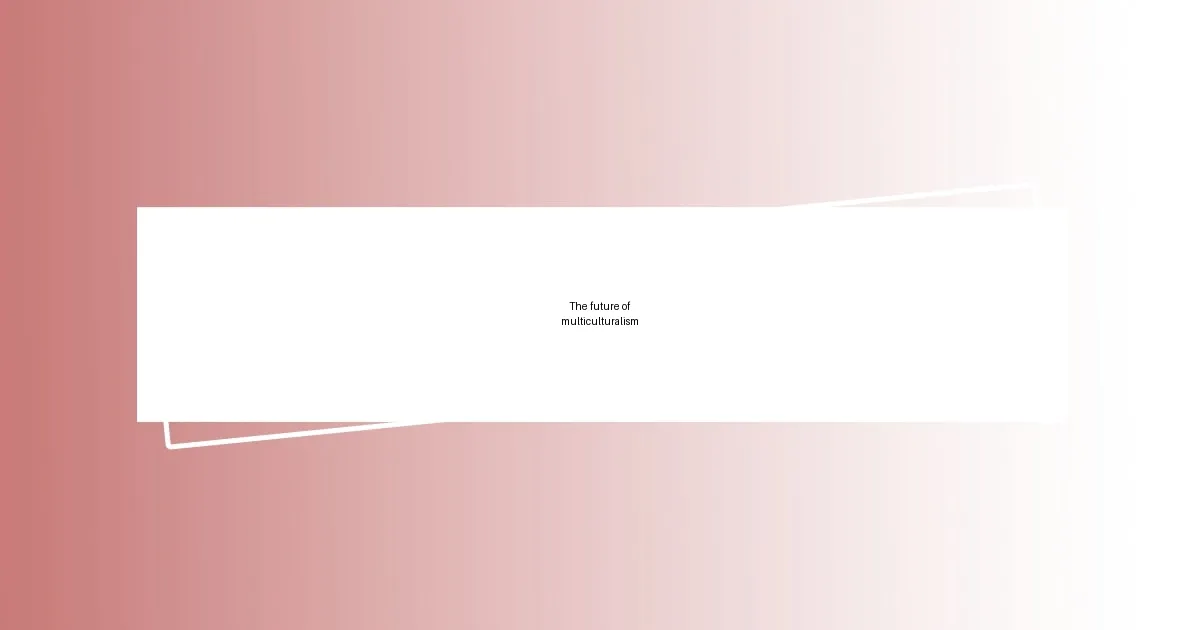
The future of multiculturalism
Looking ahead, I believe multiculturalism’s future hinges on our willingness to embrace change and challenge our own biases. I once attended a roundtable discussion that confronted the raw truths of privilege. The stories shared by participants were not just enlightening; they sparked a deep reflection in me. What if everyone took the time to listen in such spaces? Imagine the depth of understanding we could achieve.
As society evolves, so does the definition of identity. I recall a conversation with a friend who identified as biracial. She shared how navigating her dual heritage enriched her life but also presented unique challenges. It made me realize that our communities must provide support for these multifaceted identities. How can we create spaces that celebrate complexity instead of forcing individuals into singular boxes?
Looking toward the future, technology will play a pivotal role in fostering multiculturalism. I remember the vibrant discussions I had on social media platforms about cultural festivals across the globe—connecting with people I’ve never met in person but felt culturally linked to. This digital arena offers a powerful opportunity to unite diverse voices. Isn’t it exciting to think about the potential for global friendships to blossom through shared experiences and understanding?









